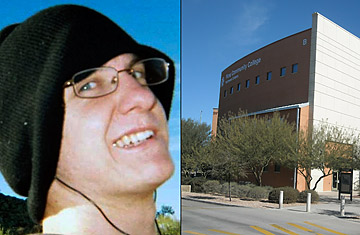
Jared Loughner, left, and Pima Community College
(2 of 2)
Other than a public breakdown and a threat to order, however, institutions with some sense of guardianship over individuals, like schools, colleges and, perhaps, corporations, may be the only potential intervenors — though even then, their options are limited by law and by the efficiency of bureaucracies. "At an institution like a university, this [has become] an expected problem," Duckworth says of mental illness. He reports that mental-health professionals working in college settings are overwhelmed by the intensity of the illnesses they see and by the sheer numbers of students in need of treatment.
An investigation conducted after Cho Seung-Hui shot 32 people dead at his school, Virginia Tech, in 2007 found gaps in that state's mental-health system. Yet even proper execution of the state's existing laws might have prevented the tragedy, either by preventing Cho from buying a gun or by forcing him to receive outpatient treatment for his mental illness, which had been identified (in fact, Virginia Tech had him institutionalized briefly but did not follow up after his release). Officials fell down on both counts. "Even in states that have a more paternalistic leaning," says Duckworth, "it's frequently about not executing. There's a passive quality to [enforcement]." (Just this past December, the U.S. Department of Education issued a report saying Virginia Tech violated a federal law on the morning of the shooting by not doing more to warn students that a shooter was on the loose on campus. The university denies it acted improperly.)
In fact, Cho's case is closely analogous to Loughner's, and it is becoming clear that officials at Pima Community College could have noticed sooner that the student was dangerous and unstable. For at least 18 months prior to the Virginia Tech massacre, Cho had shown many disturbing signs: bizarre writings for classes that included revenge fantasies; the stalking of at least three women; near total silence, including with his roommates; and even involuntary commitment to a mental institution. Similarly, it seems that Pima Community College (and Loughner's classmates and instructors) didn't do enough to recognize at least six warning signs in Loughner:
1. For months, he showed a classic symptom of psychosis: disorganized thoughts and speech. He routinely made irrelevant and nonsensical comments in classes. On one test, according to the Washington Post, he wrote, "Eat + Sleep + Brush Teeth = Math." On another test, he wrote, "Mayhem Fest!!!"
2. He showed another symptom of psychosis, or at the very least, an inability to function in social situations. One example from the New York Times: he enthusiastically read a poem in class in which he discussed touching himself in the shower.
3. He showed signs of paranoia, telling a classmate that U.S. currency was worthless and that the government was seeking to control people through grammar. He also became interested in a concept he called "conscious dreaming" (a concept at the heart of the mind-bending thriller Inception).
4. He regularly smoked marijuana, and while there is only a small correlation between having a mental illness and committing violence, that correlation becomes much more significant when mental illness is combined with drug use, according to John Monahan, a professor of psychology at the University of Virginia School of Law.
5. Several classmates said Loughner scared them. One of them even wrote e-mails in June saying she was afraid he would bring a gun to class. A teacher worried every time he had his back to Loughner that the student would pull a gun on him.
6. Loughner had five contacts with campus police, although it is not clear what behavior led to those contacts.
Hindsight is perfect, of course, but all institutions need to monitor students and employees who are consistently acting strangely. There was arguably enough evidence for Pima authorities to go to a judge and have Loughner involuntarily committed to a mental hospital, as Virginia Tech did with Cho. At the very least, the college could have required Loughner to check in with a counselor on a daily or weekly basis.
